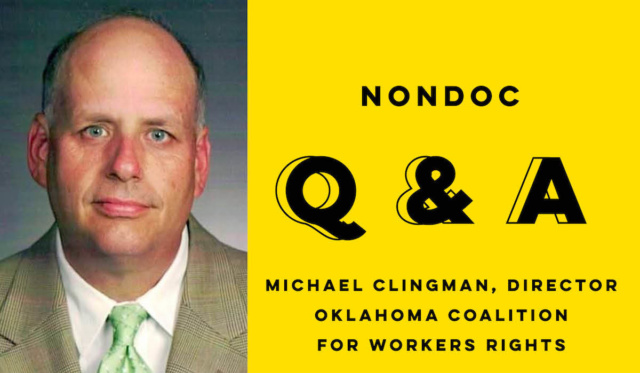Formed in 2015, the Oklahoma Coalition for Workers Rights (OCWR) seeks to bring greater awareness to recent changes in two key areas of Oklahoma’s employment laws: workers’ compensation and unemployment compensation.
Additionally, the coalition seeks to raise the minimum wage — either the federal-minimum wage, a new state-minimum wage or both.
In this funded Q&A, OCWR director Michael Clingman explains how these social-insurance safety nets are critical to Oklahoma’s economy and to the well-being of Oklahoma working families. Questions and answers were originally submitted via email, and responses have been lightly edited for length, style and grammar.
How would you analyze the condition of workers’ rights in Oklahoma currently?
In the area of workers’ compensation, changes enacted in 2013 in Oklahoma established the lowest benefits and the worst worker protections in the United States. These changes have been devastating to Oklahoma’s working families.
Workers’ disability benefits were cut from, depending on the case, 30 percent to 90 percent! New provisions removed almost all decisions from workers regarding their own health care and allowed insurance companies and employers to deny all benefits simply due to missed medical appointments, to name just a couple of the dozens of examples of where the rights of workers were trampled.
New provisions also allowed employers to opt out of workers’ compensation altogether but retain immunity from employee lawsuits, allowing those employers to establish rules that deny coverage if, for instance, an employee does not formally notify an employer of an injury by the end of a day’s shift. Some opt-out plans went so far as to say that if an employer offers a settlement of a case and the employee refuses whatever offer the employer chose to present, then the employee gets nothing and the case is dismissed.
In slashing workers’ compensation benefits to the lowest levels in the United States and in redefining eligibility for unemployment compensation in Oklahoma, our state leaders are harming Oklahoma’s greatest resource: our working men and women.
The Oklahoma Supreme Court just issued a major ruling that overturned a chunk of the state’s controversial Workers’ Compensation Act. Where did you stand on that issue, and how do you view the decision?
Recent Supreme Court decisions have rendered several provisions of the new workers’ compensation law unconstitutional. The decisions have provided relief from some of the worst provisions of the new law. They agreed with the new Oklahoma Workers’ Compensation Commission that the opt-out law mentioned above was an unconstitutional special law. They found that workers do not have to forfeit permanent disability benefits simply because of a return-to-work offer, something no other state has ever dreamed of doing. They also found that some workers’ injuries do not have to be evaluated by the AMA Guides, a ruling that not only allows workers to put on all evidence regarding their injury but also restored benefits previously cut for injuries to legs, feet, arms, hands, etc.
Our Supreme Court has done an excellent job of examining the new law in light of constitutional protections granted to all Oklahoma citizens and restoring those rights guaranteed by the constitution that the new law took away from workers.
What should the public expect to see next after that ruling?
There is a good chance that business lobbyists will try to enact new laws that, once again, unconstitutionally restrict workers’ rights to the remedy guaranteed all citizens in the constitution. Our hope is that the new Legislature will examine such proposals very carefully and reject provisions that are harmful to Oklahoma’s working families.
Can you tell us some of the worst stories you have heard regarding an injured worker in Oklahoma?
Every day a worker in Oklahoma suffers a devastating life-changing injury on the job. The anecdotes are way too numerous to mention. The question to me is, what do the rest of us do for our fellow citizen once such an injury occurs?
Workers’ compensation laws by their very nature are not good at compensating for severe injuries, and this is true in all states. When you install a no-fault system and establish statutory benefits for all injuries, you are, by necessity, undercompensating workers with severe injuries. Oklahoma, in reducing benefits for all workers to the lowest in the nation, is causing catastrophic damage to families who have a worker who suffers a major injury.
For example: A 30-year-old employee working on an oil rig suffers a devastating head-and-neck injury when a large pipe lands on him, causing a skull fracture, brain injury and broken vertebrae in his neck. Such an injury is undercompensated in most states and certainly is undercompensated against what the employee could receive if he could prove the accident was preventable and sought compensation from a jury.
Oklahoma undercompensated this case before the change in the law, but look at what happens to this worker under the new law: He was making $1,200 per week in his job before the accident (not a lot for someone working on oil rigs). During his year off work recovering under the old law, he would have received $41,652 in weekly benefits compared to the $62,400 he received while working. That’s a 33 percent cut. Under the new law, upon passage, he received $29,172, a 53 percent cut.
To compensate him for a permanent disability that he will have for the rest of his life, assuming he had 40 percent disability to his head and 30 percent disability to his neck after surgeries, the old law likely would have given him $113,000 for those permanent injuries, but the new law would give him only $45,220, regardless of how much he lost in wages over his lifetime that could be directly attributable to the injury. Given the severity of the injuries in this case, it isn’t hard to imagine that he could not return to the oil patch but was forced to take a job making considerably less.
This is an outrage and no way to treat our fellow working Oklahomans, because this is not a case of an employee being taken advantage of or being ignored by an insurance company. This is the system our state officials have asserted is fair to injured workers. Many, including myself, believe these benefit levels no longer provide an adequate remedy for workers, and that makes our new workers’ compensation law and benefit structure unconstitutional.
If someone is injured on the job in Oklahoma, what do they need to do to ensure proper assistance?
For more minor injuries, an insurance-claims adjuster or employee-benefits professional can provide needed information on what a worker should do, and this happens in the large majority of cases. The Oklahoma Workers’ Compensation Commission has an assistance program that employees and employers can contact to better understand the law.
Sometimes in more severe cases or when employees are denied compensation unlawfully, employees can contact an attorney for assistance. The attorney fees are set out by statute and come out of any award for permanent disability to which the worker may be entitled. In addition, workers can check out our website, OCWR.org, or the Oklahoma Coalition for Workers’ Rights on Facebook for news and progress toward issues affecting Oklahoma’s working families.
(Editor’s Note: Funded content appears in accordance with deals NonDoc makes with its advertisers. If you own or represent a business or organization and would like to set up a similar agreement, please visit our advertising page or email info@nondoc.com for more information.)






















